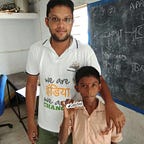Samaaj data – Open Digital Public Goods for and by – the community
What is Samaaj data: Samaaj data is a web platform that help visualise civic and environmental information about your neighbourhood in a map.
The platform loaded with local data can help understanding the neighbourhood better and take informed decisions.
What is local data and why is it helpful: The local civic and environmental problems varies from context to context – it can be location, type of issue, scale of issue etc.,
Each problem would need a local solution and to arrive at that local data is very important. For anyone who wants to develop their skills through local problem solving local data is very much essential. This local data will not only include issues reported, civic amenities but also communities and organisations who could very well be in interest to collaborate in solving the problem – this includes details about local authorities and elected representatives.
Why is Reap Benefit building Samaaj data:
Reap benefit mission is to build a nation wide movement of 10 million action based citizens who take action at their neighbourhood level by 2030.
Idea rooted in locals: The core ideology in building the movement is rooted in the ideas of locals – local data, solutions and communities.
The belief is this type of engagement will lead to:
- Skill activation and Environment saving in short term
- Crowd sourced Open Digital Public Goods of data in mid term
- Resilient and sustainable communities in the long term
Crowdsourcing local data and providing ease of access to the same to different stakeholders plays a vital role. While data can be made available in different ways – Samaaj data does it in Map view enabling inclusion, diversity and relevance.
Hence, the version 1 of Samaaj data with 61K data points already live on this link: https://Samaajdata.org
The Samaaj data platform bring the transparency and data power for change makers to regain the agency. The organisation who work on ground can very well utilise the platform to reachout to near by communities where the help or support needed.
For authorities and elected representatives this can give overview about various citizen given aspects about the locality.
Currently, the data is being collected from citizens through WhatsApp and added into the platform.
Here is a simple example – combining several incidents of the past into a single story.
Disclaimer: this is an attempt to explain usecases via storytelling
Varun has moved to a new locality while it is a residential area there are issues of Mosquito menace and Garbage hotspot. While Varun initially didn’t care about it – like most people. One day, in his neighbourhood there are lot of cases of mosquito related diseases.
He was curious to find the root cause and upon investigation he found there are several garbage hotspot that is also a mosquito breeding spot.
Tried reporting the issue on available forums but no luck. He then decided to mark all such hotspots then he realised the need to work with more people and move towards collective action. Through Samaaj data platform he found a RWA who are quite active in solving issues. Upon checking their User Profile got to know the recent action has been related to clearing blackspot. Varun got in touch and gathered their experience.
Varun then gathered some people in his neighbourhood and with help of Samaaj data platform he can connect with nearby organisations and citizen communities. Since they were also suffered because of this issue.
Several petitions were sent as a group while one or two spots were cleared still plenty left. The respective authorities requested to share accurate locations of garbage hotspots. Since the people on ground finds it difficult to locate Varun decided to take the technology route.
Varun with the help of Samaaj data platform got details of active citizens, RWA and NGO’s. Launched a mapping campaign in the locality where they mapped all these hotspots via WhatsApp. Later they shows up on the platform.
Varun and team then uses the data mapped on the platform to reach more people and also with relevant authorities.
Since the data on the platform will be automatically mapped with the ward, assembly details. It became easier to share accurate spots and their local governance information during Area and Ward Sabha gathering which lead to more people joining the effort and passing of resolution to fix the issue.
With the data gathered upon on analysis it was identified the major hotspot were in two specific spots where there isn’t been proper availability of trash cans . The same was submitted as a report by a local organisation to the authorities and relevant action been taken.
This is an example of how access to local data – issues, communities, authorities, ward and constituency information can facilitate impactful problem solving.
Way forward beyond 1.0:
- Addition of Data: Going forward the idea is to populate the platform with more content.
- Engagement: Data being used in problem solving
- Spread the word: Let the world know about Samaaj Data
Ways to get involved:
- Contribute data to the ecosystem: By enabling your data to go on Samaaj data will enrich the availability of local information which will help in problem solving and building Public Goods of Data.
- Help in creating mapping communities
- Share your opinion on the platform using Share feedback button you seen on: https://Samaajdata.org
